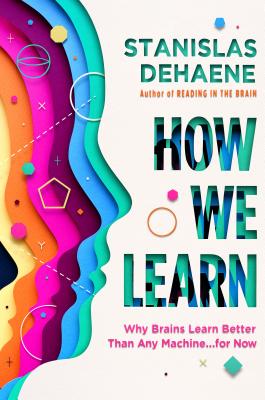|
uAn illuminating dive into the latest science on our brain's remarkable learning abilities and the potential of the machines we program to imitate them
The human brain is an extraordinary machine. Its ability to process information and adapt to circumstances by reprogramming itself is unparalleled and it remains the best source of inspiration for recent developments in artificial intelligence. In How We Learn, Stanislas Dehaene decodes the brain's biological mechanisms, delving into the neuronal, synaptic, and molecular processes taking place. He explains why youth is such a sensitive period, during which brain plasticity is maximal, but assures us that our abilities continue into adulthood and that we can enhance our learning and memory at any age. We can all learn to learn by taking maximal advantage of the four pillars of the brain's learning algorithm: attention, active engagement, error feedback, and consolidation. The exciting advancements in artificial intelligence of the last twenty years reveal just as much about our remarkable abilities as they do about the potential of machines. How We Learn finds the boundary of computer science, neurobiology, and cognitive psychology to explain how learning really works and how to make the best use of the brain's learning algorithms, in our schools and universities, as well as in everyday life. (From the blurb) My thoughts: Written in a very captivating manner, easy to follow and understand, How We Learn discusses one of the most important abilities that dstinguishes humans form the rest of the world- our ability to learn in a conscious way. Stanislas Dehaene is a neuroscientist who has written a number of books to help the general public understand better how our brains use information in order to learn and create. The amount of information available to us nowadays is staggering. Our ability to select and process input in order to adapt to and enhance our environment as well as using feedback as the most important learning tool are the reasons why we keep surviving and advancing our knowledge. Stanislas Dehaene looks in detail at the biological processes that happen in our brain, and discusses the issue of neuroplasticity and learning at different ages. As we live in a very technological society, it is not surprising that our interest in the science of learning is partly driven by our desire to develop 'smarter' machines and artificial intelligence. But it is not the only reason why we should keep trying to understand our learning process better. Our life is already calling for a life-long - 360° learner able to cope with the speed with which our world is changing. This is why this thought-provoking book is so important and timely. Thank you to Edelweiss and Viking for the ARC provided in exchange for an honest opinion. Comments are closed.
|
Archives
October 2020
Categories |

 RSS Feed
RSS Feed
